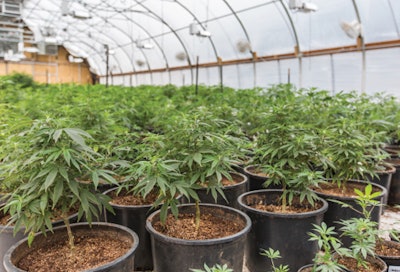
1:30 p.m. 06/02/17 Update: This story was updated to specify Livwell's lawsuit was dismissed in court.
As the cannabis industry continues to expand, and standardization and acceptance continue to move forward, the risks associated with providing consumable products to a growing portion of the population will increase. In other words, more consumers purchasing cannabis products equals a greater risk for consumer claims. Cultivation operations should take the steps necessary to ensure they are adequately insured should a claim arise. Because of this, it’s critical that business owners take their time in selecting the most appropriate insurance coverage for their business. Not only is it smart for your business, but in some states, such as Washington, cultivators are required to purchase insurance (according to the state’s Office of the Insurance Commissioner).
In the days of unregulated sales and basement cultivation, mitigation of risk through insurance policies was the furthest thing from most cannabis cultivators’ minds. The very act of cultivation, distribution and sales was, in itself, a risky endeavor, and no policies existed to protect farmers from a no-knock raid. Things have changed dramatically in the past few years, as numerous U.S. states and Canada have legalized commercial cannabis cultivation and sale for recreational and/or medical purposes.
With seed-to-sale tracking being the standard for Cole memo compliance, it’s now possible for consumers to identify and trace their cannabis purchases back to the farm that cultivated it. This level of accountability, while great for consumers, places additional pressure on businesses to ensure they are covered in the event of an injury or claim.
In the past few years, several product liability and injury lawsuits have been brought against cannabis companies for pesticide usage, including LivWell, Inc., based out of Colorado, and most recently both Mettrum Ltd. and OrganiGram of Canada face similar suits. While decisions and settlements have not been reached in any of these cases (update: Livwell's case was dismissed early in 2016), there is no reason to believe that this is the end of class action and liability claims against cannabis companies. As cannabis businesses grow and increase their footprint in various states throughout the U.S., an increase in legal action against these businesses will likely follow. If they haven’t already, now is the time for cannabis cultivators to get their operations covered in order to protect their company and its assets.

Steve Walser, founder of Buddy Boy Farms in Washington, notes, “With the limited number of companies, insurance is quite a bit more expensive than farm liability, as well as property coverage. The cannabis policies I have seen also have more exclusions.”

Most other business types may simply conduct a Google search for insurance agents or open up the phone book to be presented with hundreds, if not thousands of prospective insurance companies eager to do business with them and provide competitive quotes; however, this is not the case for cannabis businesses. As Patrick McManamon, founder and CEO of Cannasure Insurance Services, LLC, explains, “Standard insurance carriers [typically] do not feel comfortable insuring cannabis businesses since it’s still federally illegal. When that changes, there will be more insurance companies willing to step in.”
Until Congress admits defeat in the War on Drugs and completely legalizes cannabis, a limited number of carriers and agencies are looking to meet the industry’s needs. It’s important that cultivation owners do not attempt to secure more affordable coverage through a more “traditional” insurance company by omitting that they are cultivating cannabis, as this can result in denial of a claim or cancellation of the policy. Cultivation business owners can save a lot of time and frustration by speaking with agents already working in the cannabis space. Look for insurance companies’ advertisements in industry magazines, sponsorship of cannabis events and conferences, as well as their presence at industry networking events.
Selecting Coverage

Cultivation businesses will want to meet the insurance carrier’s requirements to qualify for coverage. This typically includes using a facility that is fully permitted, and fire- and building-code compliant. “They also need to be in compliance with their state and city/county regulations for cannabis businesses,” McManamon says. An insurance carrier will look for proper risk-management measures to be in place, including security, quality control, product testing and recall procedures; and it will review the business owner’s industry experience. Often a full facility inspection will be required prior to the policy being issued.
When it comes to insurance coverage for a cultivation business, a number of policy options are available. Some of the basic policies every cultivation operation should have include:
- General Liability: provides protection against losses caused by the company or its employees in addition to protection against third-party lawsuits.
- Property Coverage: protects businesses against loss or damage to their buildings and contents due to a covered cause of loss, such as fire or theft. It may also cover loss of income or increased expenses that results from the property damage.
- Product Liability: coverage in the case of someone using a business’s product and claiming to have an adverse reaction.
Other types of coverage a cultivation operation should consider include:
- living plant coverage (also known as crop insurance),
- coverage for goods in process and finished stock,
- commercial automotive and
- excess liability.
Most policies include exceptions to coverage that include seizure by law enforcement.
It’s also important that cultivators understand the coverage requirements of the state in which they operate and the vendors with whom they work. In Washington state, for example, the Washington State Liquor and Cannabis Board must be named as an additional insured on all licensee’s policies because, in the event of a product liability claim, the suit will likely name all related parties, including the producer/processor, retailer/dispensary and licensing/regulating agency. Also, many retail stores will request to be named as additional insured on a cultivator’s policy if they do a large volume of business with them.
Many business owners are shocked by the price of cannabis insurance policies. The perceived risk and lack of competition amongst carriers spell high prices. Policy premiums are based on a number of factors including risk classification, historic revenues, estimated revenues, total value of the insured property, type of construction used in the building of the facility, the crime statistics of the area and types of policies being considered.
The price of being under-insured or not insured, however, can be higher still. As McManamon points out, “Lack of appropriate insurance coverage could not only jeopardize the licensure of the company, it could also result in significant economic loss, or total loss of their business.” Not having adequate coverage could result in a payout from [an insurance] carrier that is not enough to cover the actual damages, which could devastate a company.
Know What Your Coverage Includes
Prior to signing on the dotted line, it’s important that the policy is clearly understood. Business owners should know exactly what is covered and excluded in the policy. The agent should clearly present policy definitions and details.
It’s also good to ask the agent questions about how long they’ve been selling insurance, serving the cannabis industry, which states they’ve been selling policies in, etc.

Jeramee Sauls of Terry L Edwards Agency recommends that a business owner asks the agent if they are a resident of the state the cannabis business is in, and also inquire how often the agent is in the office. “The major complaint I hear from customers is they can’t get in touch with their agent, and it takes a long time for them to return calls,” he says.
It is also always a good idea to get quotes from multiple carriers.While shopping for insurance can be daunting due to the limited number of companies serving the market, as well as higher prices due to lack of competition and providing coverage to a high-risk market, insuring your business against the many risks it faces is critical. You’ve invested so much time and money in your business, so make sure you are prepared with the coverage you need to stay in business following a consumer claim, theft, fire or other disaster.















